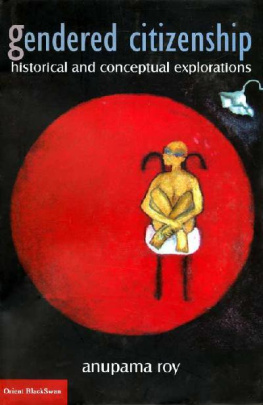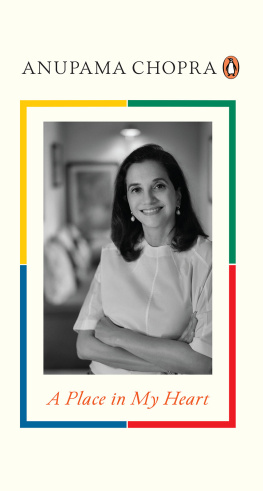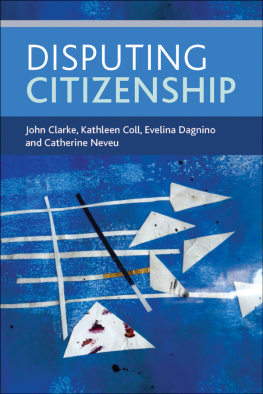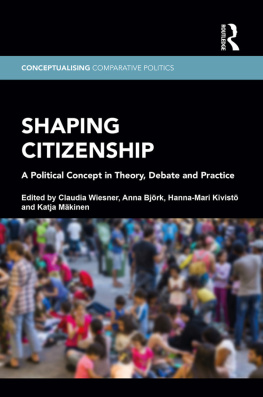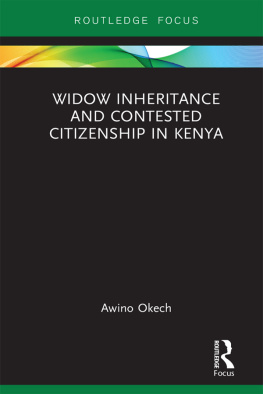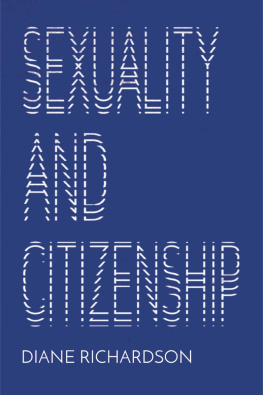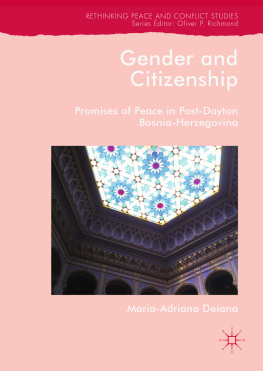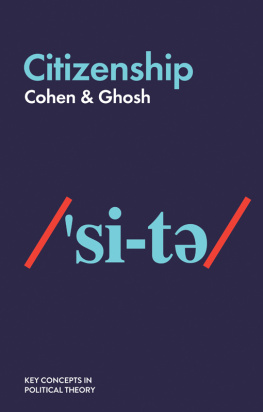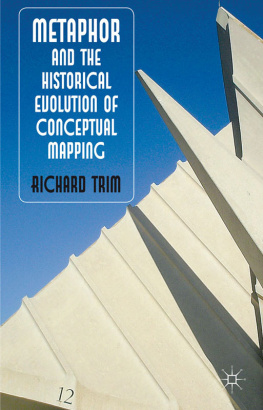GENDERED CITIZENSHIP
For our entire range of books please use search strings " Orient BlackSwan ", " Universities Press India " and " Permanent Black " in store.
Gendered Citizenship
HISTORICAL AND CONCEPTUAL EXPLORATIONS
Anupama Roy
Orient Blackswan Private Limited
Registered Office
3-6-752 Himayatnagar, Hyderabad 500 029 (A.P.), INDIA
e-mail:
Other Offices
Bangalore, Bhopal, Bhubaneshwar, Chennai,
Ernakulam, Guwahati, Hyderabad, Jaipur, Kolkata,
Lucknow, Mumbai, New Delhi, Noida, Patna
Orient Longman Private Limited 2005
First Published 2005
eISBN 978 81 250 5325 5
e-edition:First Published 2013
ePUB Conversion: .
All rights reserved. No part of this publication may be reproduced, distributed, or transmitted in any form or by any means, including photocopying, recording, or other electronic or mechanical methods, without the prior written permission of the publisher, except in the case of brief quotations embodied in critical reviews and certain other noncommercial uses permitted by copyright law. For permission requests write to the publisher.
Contents
Acknowledgements
Evolving from my doctoral research at the State University of New York, Binghamton, this work was substantiated and completed in the course of the Sir Ratan Tata Fellowship at the Institute of Economic Growth, Delhi. I am indebted to both institutions for providing the space for a convergence of scholarship cutting across disciplinary boundaries. I learnt much from Professor Kelvin Santiago-Valles as his student and teaching assistant. Professor Caglar Keyder's course on peripheral societies was responsible for concentrating my interests in the present field of study. I express my gratitude to both of them for helping me develop the concepts and methodological tools for exploring issues within a framework of sociohistorical transformations. I read and re-read with great interest Professor Gladys Jimenez Munoz's works, deriving useful insights and analytical frameworks for understanding issues of shared concern. Late Professor Terry Hopkins was always a source of inspiration and his memory continues to motivate me. I acknowledge also the support I received from Professor Ana Davin and Professor Juanita Diaz. I am also obliged to Dr David Taylor for his valuable suggestions during the course of my research. For Professor Manoranjan Mohanty and Professor Patricia Uberoi, I have deep respect. In their distinctive ways, at different moments, both of them have encouraged me to know my capacities and to have faith in myself. I thank Biswamoy Pati for showing me the way and Nivedita for her comments and suggestions, which helped me weave together the arguments that lay scattered across the book. I thank my friends and colleagues at Binghamton University, Punjab University, Institute of Economic Growth, and the Centre for Women's Development Studies for their support and for many memorable moments of companionship and collegiality. I thank the library staff at the Glenn Bartle Library, Binghamton, Cornell University Library, Cornell, India Office Library, London, School of Oriental and African Studies Library, London, Hindi Sahitya Sammelan Library, Allahabad, Nehru Memorial Museum and Library, New Delhi, Ratan Tata Library, Delhi University, Parliament Library, New Delhi, the A.C. Joshi Library, Chandigarh, and the libraries at the Institute of Economic Growth and Centre for Women's Development Studies for giving me access to their facilities. The Sir Ratan Tata Trust I thank for the postdoctoral fellowship which gave me space and freedom to continue my research and complete my manuscript. I also acknowledge the financial support I received from the Charles Wallace Trust for my stay and research in London. The Dissertation Year Fellowship awarded by the Binghamton University enabled me to complete my degree at Binghamton University. The comments and suggestions that came from the anonymous referee were extremely helpful in sharpening some arguments and removing ambivalence in others.
My familyma and papaji, Ujjwal and Anatya, sisters Anamika and Aparna, Bhaiya and Bhabhijihave always been a source of strength, love and affection. I dedicate this work to my parents Usha and Siddeshwari who simply gave without expectations of return.
Citizenship: Conceptual Exploration
More than twenty years after the concept of citizenship had gone 'out of fashion' among political theorists, its return was announced in 1994 in an article titled 'Return of the Citizen: A Survey of Recent works on Citizenship Theory' in the journal Ethics (Kymlicka and Norman 1994, 352).
One is left bewildered by this sudden burst of energy among scholars to redefine the frontiers of citizenship in a supposedly 'new' context of globalisation. The assumption on which the redefinition of citizenship is proposed as well as the terms of redefinition appear fraught with contradictions. The present work engages with this scholarship to unravel these contradictions. It proposes that the 'newness' of the circumstances described as 'specifically' late twentieth century were present at least a century before and may be seen as persisting from the nineteenth century. It was largely in the context of 'globalisation', that is, the expansion and consolidation of Europe, a feature of the modern world system from the sixteenth century onwards, the slave trade, imperial domination, competition among states and political and social groups within states, and the production of the 'West' and 'the colonies' or the 'third world' as sociohistorical realities that mutually though hierarchically constituted each other, that the discursive formulation of the 'universal citizen' took place. The notion of 'man' and 'citizen' was part of the same discursive formulation, one augmenting the other. The exclusionary domain of citizenship was very much conditioned in this context by the way women, slaves, workers, and subject peoples as social categories and as lived experiences were simultaneously incorporated within and omitted from national-cultural and juridico-political identities as citizens.
Spread over six chapters, this work seeks to draw attention to citizenship as a terrain of conflict and struggle, where a multitude of social and political forces and ideological formulations exist in unequal and often conflicting relationships. It argues that in specific historical contexts, the 'citizen' is an exclusive category, epitomising the hegemonic socioeconomic forces. At the same time, it also seeks to show that the idea of citizenship is potentially emancipatory, so that at different moments in history 'becoming a citizen' has involved either an extension of the status to more persons or a liberatory dismantling of hitherto existing structures of oppression, which were replaced by more egalitarian and inclusive structures. This work hopes to bring out this paradox in the nature of citizenship by stressing its liberatory potential as a 'momentum concept' as well as the limits of the concept that immediately come into play when citizenship unfolds in practice. While delineating citizenship's paradoxical nature, this work also points out that as an analytical category, its constituent elements are uncertain and often contradictory, making it difficult to outline a precise notion of citizenship. There would be divergent responses, for example, to questions pertaining to whether rights or duties are the defining elements of citizenship, or whether the arena of politics or state activities is its rightful domain as opposed to the spheres of culture, economy, and society. Again, there would be also no consensus on whether citizenship is only a status or a measure of activity, on what is of primary significance for citizenshipthe autonomy of the individual or the community and the societal contexts which shape the needs of the individualand on questions pertaining to the unit of membership, viz., the nation-state, or the global civil society.


